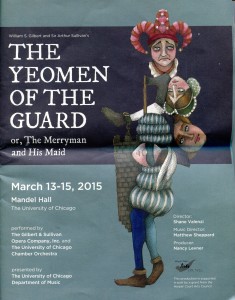The Gilbert & Sullivan Opera Co. drew a solid crowd for the matinee of The Yeomen of the Guard on Sunday afternoon. Not a full house, but a decent turnout, including a small busload of seniors from somewhere or other. But unlike at some events, I wasn’t one of the younger members of the crowd. There was a good mix of ages.
 Mandel Hall was the venue. A handsome place on the University of Chicago campus — I’d like to see it in this light — and almost as old as Yeomen, since it was originally designed in 1903 by Shepley, Rutan and Coolidge. Not the Savoy, but what is?
Mandel Hall was the venue. A handsome place on the University of Chicago campus — I’d like to see it in this light — and almost as old as Yeomen, since it was originally designed in 1903 by Shepley, Rutan and Coolidge. Not the Savoy, but what is?
Though done at a college, the show wasn’t collegiate. The highly accomplished company goes back to 1960, and, according to the program notes, “has a policy of alternating the signature operas with the obscure, taking into consideration anniversary years and programming by other local companies.” This was its seventh production of Yeomen, with HMS Pinafore, The Mikado, and The Gondoliers also done that many times over the years. (At the other end of the spectrum, Utopia, Limited and The Grand Duke have been done once each in 55 years.)
Good fun, as G&S should be, but also not quite as much levity as you’d expect in a romantic romp of switched identities, instant attractions, and lines like this: “These allusions to my professional duties are in doubtful taste. I didn’t become a head-jailer because I like head-jailing. I didn’t become an assistant-tormentor because I like assistant-tormenting. We can’t all be sorcerers, you know.”
Spoken by Wilfred, the head jailer and assistant tormentor of the Tower, portrayed by Brad Jungwirth, a bald slab of a baritone, whose voice and character I enjoyed the most. The rest of the cast turned in fine performances as well, in as much as I’m qualified to judge, as did the University of Chicago Chamber Orchestra.
Maybe there should be more romantic comedies in which love doesn’t quite conquer all, as in Yeomen. After all, it ends with three couples paired up, two of which involve less-than-enthusiastic participants, and one of which leaves a sympathetic character (the merryman Jack Point) as the odd man out, much to his anguish. Then again, I guess a movie that ended that way wouldn’t test very well among focus groups.